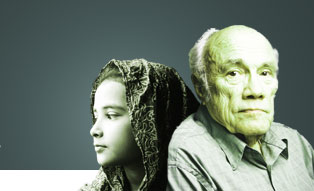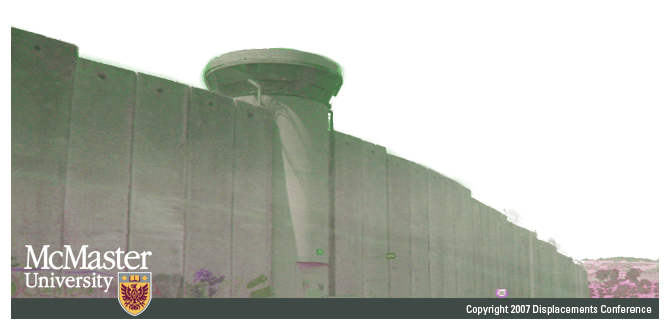|

| |
 |
| |
|

CALL FOR PAPERS
Date: March 7,8,9 2008
Venue: McMaster University
Submission deadline: September 1, 2007
Displacements: Borders, Mobility and Statelessness
Speakers include: Maroussia Ahmed (French, McMaster University), Barbara Jackman, Immigration Law, Toronto; Morteza Jafarpour (Settlement and Integration Services Organization, Hamilton), Peter Nyers (Political Science, McMaster University).
In a world described as increasingly on the move, refugees, displaced, stateless persons and immigrants (forced or voluntary) constitute a large portion of the world’s population. The distinctions between those who have the option to migrate and those who are forced into displacement (at home or abroad), between those who are allowed access at border points and those who are not, between those who are privileged with citizenship and those who are refused it – these distinctions have become pressing issues for academic and socio-political work. This conference brings together academics, activists, advocates, artists, and other cultural workers to examine the narratives and lyric portrayals as well as the politics of movement for Indigenous, refugee, non-status, undocumented, and other displaced persons and communities. Human encounters with borders produce variant narratives, depending on whether those encounters are welcoming or unwelcoming, ones of recognition or denial. What roadblocks stand in the way of peoples’ attempts to find better ways of life, if not the bare means of survival, in another place? And what of the blockages produced when borders are constructed to divide places where people already live?
In these various forms of displacement, how do people denied access to state provisions respond and thus constitute themselves? To what extent do various stateless persons see themselves as being part of a community that is being threatened? How is the life growing in displacement described? How are communities either created or destroyed in the processes of displacement? How do intergenerational, gender-based, ethno-racial tensions evolve through the experiences of migration, land expropriation, and statelessness? What are the cross-border identity politics that inhibit or allow self-determination? How are narratives of accidental and formal citizenship complicated and refracted as the rules that determine borders change? What are the constructive/positive transformations that take place despite forced displacement? What creativities does it engender?
Recognizing that the least permeable of borders do not necessarily parallel those of the nation-state, what other kinds of borders produce blockages for stateless persons? Are borders inherently oppressive? Are there some examples of the necessity for boundaries for communities whose way of life has been historically embattled? To what extent do boundaries and borders reflect the dynamics at the “hearth” of a nation/community? How are specific scholarly, artistic, or activist communities involved in re-drawing borders and re-narrating statelessness? Finally, how are some populations “stateless” economically, politically, and socially while retaining the material signifiers of statehood (i.e. passports, citizenship documents)? For example, how are some people economically or environmentally displaced? We welcome papers and panels from many disciplines and strive for an interdisciplinary and creative engagement with the politics of movement.
Indicative topics:
- Colonial displacements
- Sanctuary and other spaces of freedom
- Walls and fences
- Special economic zones and the expropriation of people
- Abject cosmopolitanism
- Refugees and diaspora theory
- Conflicts between displaced groups: refugees, immigrants, Indigenous peoples, diaporas
- The politics of the definition of refugeeness
- Asylum-seeking and Citizenship
- Refugees and nationalism
- Indigeneity and nationalism
- Cultural production in refugee camps and detention centres
- Stateless subjects in relation to multiculturalism
- Attempts at borderless community
- “Don’t ask, don’t tell” policies in social service practices
- Storytelling, placement and displacement
- Religious refugee communities
- Displacement and spirituality
- Displacement and race, gender, class, sexuality
- Protracted displacements
- Statelessness as productive resistance to narratives of citizenship and/or nationalism
- Homelessness versus statelessness
- The ethics of writing or reading narratives of displacement
- Relationships between refugee studies and refugee life
- Displacement in popular texts and images
- Intergenerational conflict and displacement
- Cross-border identity politics
- Subjectivity in statelessness
- Displacement and the fluid mobility of commercial goods
- Narrative and lyric portrayals of borders: thresholds, gates, gated communities
- Narrative and lyric portrayals of refuge and the conditions of refuge
- The relationship between land and story
- Portrayals of ‘being on the move’
- Land and belonging: Indigenous perspectives
- The implications of various rubrics such as “Diaspora,” “Refugee,” “Immigration,” “First Nations”
- When land on which people live is divided, subdivided
- Creativity as therapy
- Displacement and the body/ or the commodification of the body
- Globalisation and forced displacement
“Displacements: Borders, Mobility and Statelessness” is hosted by the Department of English and Cultural Studies at McMaster University in Hamilton, Ontario. The conference format will be diverse, including paper presentations, panels, round-table exchanges, artistic performances and readings. We encourage individual and collaborative paper and panel proposals from across the disciplines and from community activists.
The Displacements conference does not have funding to pay for presenters’ travel or accommodations, so presenters should plan to cover these costs themselves. |

Borders, Mobility and Statelessness
In a world described as increasingly on the move, refugees, displaced/stateless persons and immigrants (forced or voluntary) constitute a large portion of the world’s population. The distinctions between those who have the option to migrate and those who are forced into displacement (at home or abroad), between those who are allowed access at border points and those who are not, between those who are privileged with citizenship and those who are refused it, have become pressing issues for academic, activist and community work. Moreover, the work done to ensure the right of all people to participate fully in the social, economic and cultural life of host countries is often an important part of refugee and migrant life. Many community organizations (e.g. Settlement and Integration Services Organization (SISO) and “No One Is Illegal”) have worked to ensure that immigrants, refugees and displaced persons are engaged in culturally sensitive, language appropriate, anti-racist programs and services.
The Department of English and Cultural Studies at McMaster University will be hosting a multi-disciplinary conference entitled, “Borders, Mobility and Statelessness” that seeks to bridge community, NGO and academic work. This conference brings together activists, advocates, artists, and other cultural workers to examine the ways in which racism, sexism, homophobia, able-ism and class prejudice influence the processes of immigration and the administration of status privileges. This conference has a particular interest in the narratives of displacement, who hears them and how they are taken up in public sphere?
What are pressing issues for community organizations working with immigrants and/or displaced persons? How do these organizations understand their own story? How do they perceive their relationships to globalization? To local governmental structures and policies? How do these organizations fund themselves, and what types of obstacles do they face in simply existing? How do these organizations understand the differences between integration and assimilation? How can academic programs more directly interact with the needs of community groups working with refugees? What types of skills training are valuable to these organizations? Finally, how are these organizations received by different members of the refugee population?
Some specific questions include:
- How do activists and community workers negotiate the economic strain when working for the rights of immigrants, and what can be done to more adequately fund advocacy on behalf of immigrants?
- How do current political agendas, racism and practices of deportation interact with legal arrangements such as the Membership Clause, Safe Third Country Agreement, Security Certificates and Extra-ordinary Rendition?
- How does the process of immigration and displacement interact with the identity formation of “othered” (i.e. racialized, sexualized, objectified) people?
- What are the ethics and responsibilities of sharing the stories of migration?
- Finally, what roadblocks stand in the way of peoples’ attempts to find better ways of life, if not the bare means of survival? And how do people find ways to negotiate surviving when borders divide places where people already live?
Refugees and Nationalism
Cultural life in refugee camps and detention centres
Stateless subjects in relation to multiculturalism
Attempts at borderless community
“Don’t ask, don’t tell” policies in social service practices
Storytelling and displacement
Religious refugee communities
Refugeeness and spirituality
Racialized refugees
Gender and refugeeness
Protracted refugeeness
Statelessness as productive resistance to narratives of citizenship and/or nationalism
Homelessness versus statelessness
Relationships between refugee studies and refugee life
Intergenerational conflict in refugee culture
Cross-border identity politics
Subjectivity in Statelessness
Refugees and the Fluid mobility of Commercial Goods
The relationship between land and story
Portrayals of ‘being on the move’
Land and belonging: Indigenous perspectives
The implications of various rubrics such as “Diaspora,” “Refugee,” “Immigration”
When land on which people live is divided, subdivided
Creativity as therapy
Globalisation and forced displacement
“Borders, Mobility and Statelessness” is hosted by the English and Cultural Studies Department at McMaster University in Hamilton, Ontario. The conference format will be diverse, including paper presentations, panels, round-table exchanges, artistic performances, and readings by refugee or displaced authors. We encourage individual and collaborative paper and panel proposals from across the disciplines and from community activists. |
|
|
|
|


